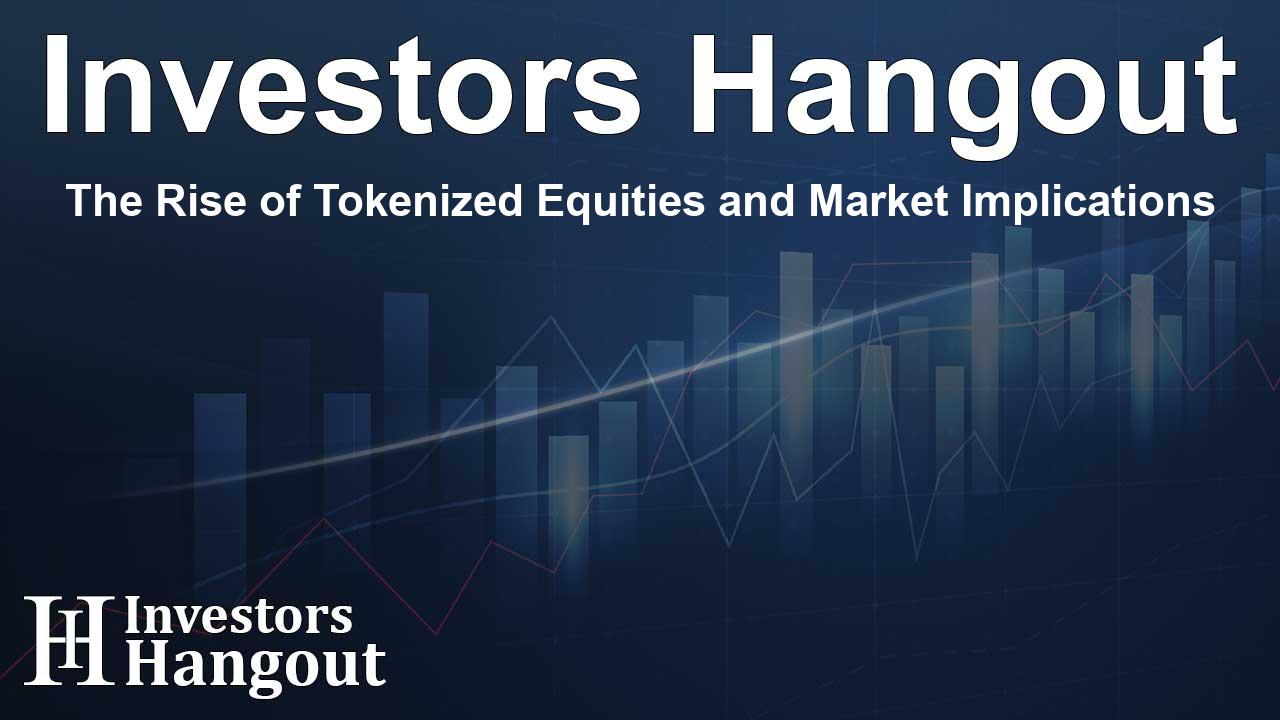The Rise of Tokenized Equities and Market Implications

Understanding Tokenized Equities
Tokenized equities represent a convergence of traditional finance and the burgeoning world of blockchain technology. These digital tokens, established on blockchain networks, provide investors with a form of exposure to a company's stock. However, it is crucial to recognize that these tokens do not confer actual ownership or voting rights, which distinguishes them from conventional equity shares.
Regulatory Concerns Expressed by the WFE
The World Federation of Exchanges (WFE), an essential voice in the landscape of global stock exchanges, has raised alarms regarding the practices associated with tokenized equities. Recently, they communicated their concerns to regulatory bodies, urging tighter oversight in this space to ensure investor protection and maintain market integrity.
Misleading Marketing Practices
According to the WFE, tokenized equities are often marketed similarly to traditional stocks, creating confusion among investors. This misrepresentation raises critical issues around investor rights and the true nature of these products, prompting the need for clearer guidelines and safeguards.
Impact on Reputations
The federation highlighted the potential reputational risks for issuers of the underlying stocks if their tokenized equivalents were to fail amidst market confusion or instability. As tokenized stocks enter the financial ecosystem, the importance of robust regulatory frameworks has never been clearer.
Market Dynamics of Tokenized Assets
Despite the claims that transactions using tokenized equities can be cheaper and settled more rapidly, skepticism surrounds these benefits. Investors are at risk of misunderstanding the actual value and safety associated with these new financial products. The WFE's Chief Executive Officer, Nandini Sukumar, has noted that both exchanges and listed companies have expressed substantial concern regarding the risks involved with tokenized equities.
Current Players in the Tokenized Equity Space
Two prominent firms making strides in the tokenized equity landscape include Robinhood and Coinbase. Robinhood has begun offering tokenized equity products in Europe and plans to expand its offerings to include tokens for private companies, reflecting a growing trend in financial markets.
Robinhood's Expansion
Robinhood, known for its revolutionary approach to trading, recently announced its venture into tokenized equities, allowing users to trade digital tokens linked to shares from various companies. This move signifies a notable shift in how equities could be traded in the future.
Coinbase's Pursuit of Approval
Coinbase, another giant in the crypto space, seeks SEC approval to introduce tokenized equities in the U.S. market. This progression underscores the increasing integration of blockchain technology within traditional financial systems and the potential it holds for reshaping investment dynamics.
Regulatory Frameworks Needed for Tokenized Assets
To address the complexities surrounding tokenized equities, experts believe a regulatory framework must evolve to encompass digital assets effectively. This framework should stipulate that securities laws are applicable to tokenized products, ensuring the same level of scrutiny and protection as traditional equities.
Clearing Confusion for Investors
The adoption of clear guidelines will help in differentiating between traditional stocks and tokenized versions, thereby enhancing transparency in the investment landscape. The WFE has called for immediate action to establish a well-defined structure for custody, ownership, and the marketing of tokenized assets.
Conclusion: The Future of Tokenized Equities
The future of tokenized equities is bright yet riddled with challenges. As technology advances, so too must our regulatory frameworks to ensure the protection of investors and the integrity of financial markets. With significant players like Robinhood (NASDAQ: HOOD) and Coinbase (NASDAQ: COIN) at the forefront of this movement, observing how markets adapt will be fascinating.
Frequently Asked Questions
What are tokenized equities?
Tokenized equities are digital tokens on blockchains that represent shares of a company, but do not grant ownership or voting rights.
Why are regulators concerned about tokenized equities?
Regulators worry about misleading marketing practices and the potential confusion among investors regarding their rights associated with tokenized equities.
Which companies are involved in tokenized equities?
Notable companies include Robinhood and Coinbase, both of which are working towards offering tokenized equity products.
What issues does the WFE raise regarding tokenized assets?
The WFE emphasizes the need for regulatory oversight, clear ownership rules, and prevention of misrepresentation in marketing these assets.
What does the future hold for tokenized equities?
As technology evolves, the regulatory landscape will also need to adapt to protect investors and ensure market integrity for both traditional and tokenized equities.
About The Author
Contact Henry Turner privately here. Or send an email with ATTN: Henry Turner as the subject to contact@investorshangout.com.
About Investors Hangout
Investors Hangout is a leading online stock forum for financial discussion and learning, offering a wide range of free tools and resources. It draws in traders of all levels, who exchange market knowledge, investigate trading tactics, and keep an eye on industry developments in real time. Featuring financial articles, stock message boards, quotes, charts, company profiles, and live news updates. Through cooperative learning and a wealth of informational resources, it helps users from novices creating their first portfolios to experts honing their techniques. Join Investors Hangout today: https://investorshangout.com/
The content of this article is based on factual, publicly available information and does not represent legal, financial, or investment advice. Investors Hangout does not offer financial advice, and the author is not a licensed financial advisor. Consult a qualified advisor before making any financial or investment decisions based on this article. This article should not be considered advice to purchase, sell, or hold any securities or other investments. If any of the material provided here is inaccurate, please contact us for corrections.
